HRM 6 Report: Talent Management Strategies at Nestle Singapore
VerifiedAdded on 2022/11/17
|7
|1558
|183
Report
AI Summary
This report provides an in-depth analysis of talent management practices within Nestle, a multinational food and beverage corporation. The report focuses on Nestle Singapore and examines key aspects of talent management, including performance management strategies, career development initiatives, and succession planning processes. It explores Nestle's approach to performance evaluation through the 360-degree feedback system, and discusses the company's strategies for career development, such as providing opportunities for employees and addressing challenges like lack of work experience. Furthermore, the report delves into Nestle's succession planning, highlighting the importance of identifying and developing new leaders, and addresses the challenges posed by an aging workforce. The conclusion emphasizes Nestle's effective talent management, its impact on employee engagement, and its role in attracting, maintaining, and retaining top talent, ultimately contributing to the company's global success.
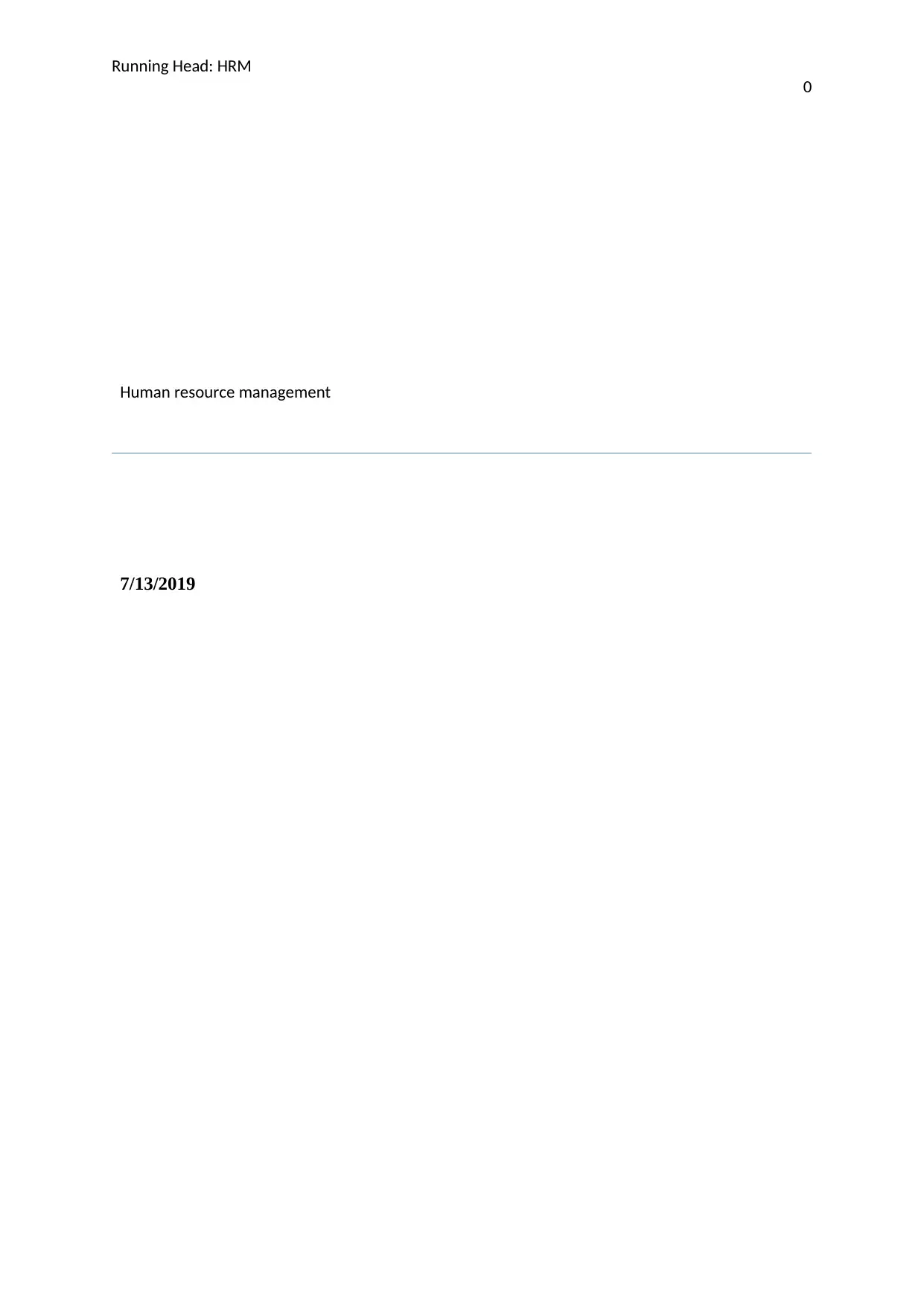
Running Head: HRM
0
Human resource management
7/13/2019
0
Human resource management
7/13/2019
Paraphrase This Document
Need a fresh take? Get an instant paraphrase of this document with our AI Paraphraser
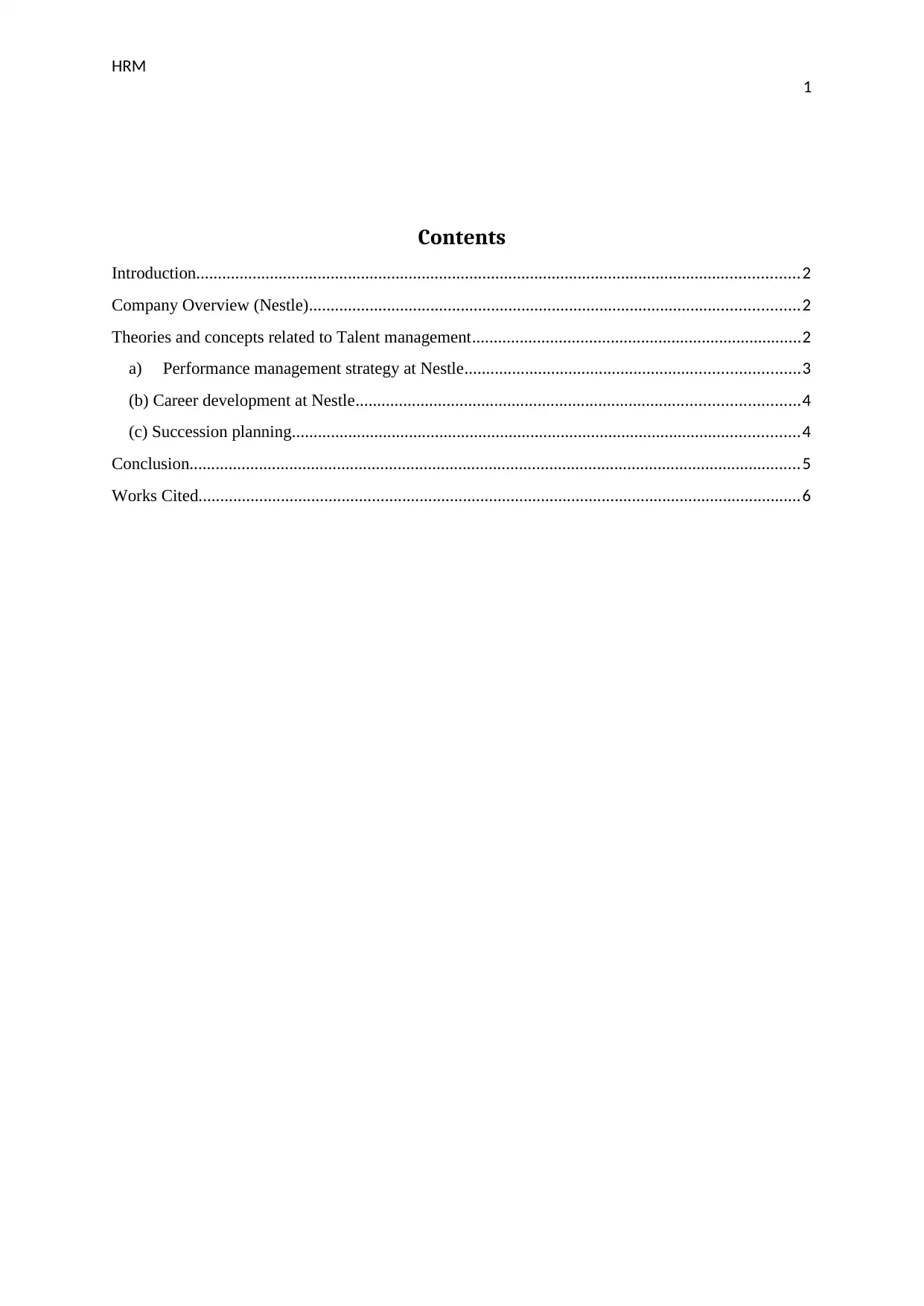
HRM
1
Contents
Introduction...........................................................................................................................................2
Company Overview (Nestle).................................................................................................................2
Theories and concepts related to Talent management............................................................................2
a) Performance management strategy at Nestle.............................................................................3
(b) Career development at Nestle......................................................................................................4
(c) Succession planning.....................................................................................................................4
Conclusion.............................................................................................................................................5
Works Cited...........................................................................................................................................6
1
Contents
Introduction...........................................................................................................................................2
Company Overview (Nestle).................................................................................................................2
Theories and concepts related to Talent management............................................................................2
a) Performance management strategy at Nestle.............................................................................3
(b) Career development at Nestle......................................................................................................4
(c) Succession planning.....................................................................................................................4
Conclusion.............................................................................................................................................5
Works Cited...........................................................................................................................................6
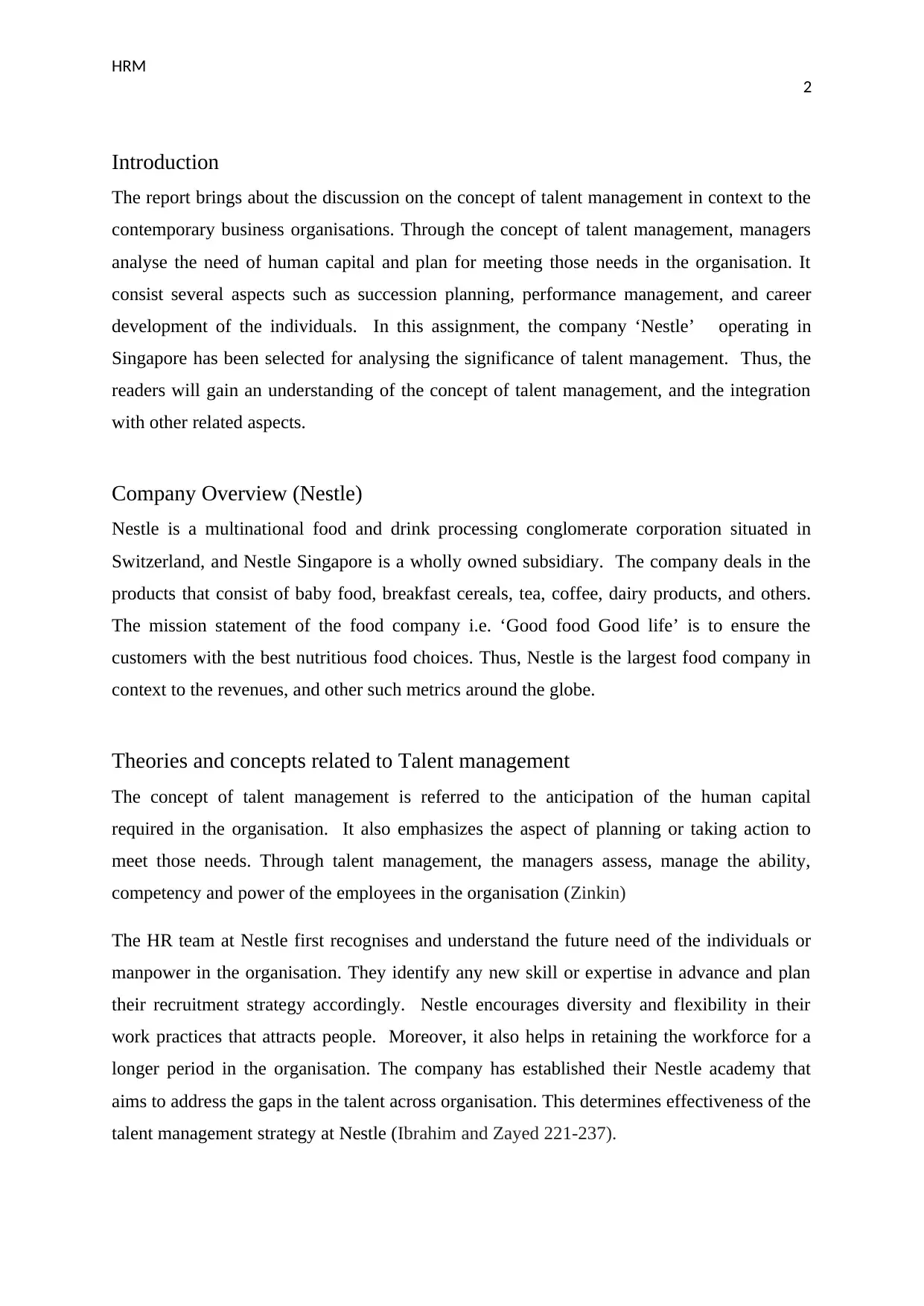
HRM
2
Introduction
The report brings about the discussion on the concept of talent management in context to the
contemporary business organisations. Through the concept of talent management, managers
analyse the need of human capital and plan for meeting those needs in the organisation. It
consist several aspects such as succession planning, performance management, and career
development of the individuals. In this assignment, the company ‘Nestle’ operating in
Singapore has been selected for analysing the significance of talent management. Thus, the
readers will gain an understanding of the concept of talent management, and the integration
with other related aspects.
Company Overview (Nestle)
Nestle is a multinational food and drink processing conglomerate corporation situated in
Switzerland, and Nestle Singapore is a wholly owned subsidiary. The company deals in the
products that consist of baby food, breakfast cereals, tea, coffee, dairy products, and others.
The mission statement of the food company i.e. ‘Good food Good life’ is to ensure the
customers with the best nutritious food choices. Thus, Nestle is the largest food company in
context to the revenues, and other such metrics around the globe.
Theories and concepts related to Talent management
The concept of talent management is referred to the anticipation of the human capital
required in the organisation. It also emphasizes the aspect of planning or taking action to
meet those needs. Through talent management, the managers assess, manage the ability,
competency and power of the employees in the organisation (Zinkin)
The HR team at Nestle first recognises and understand the future need of the individuals or
manpower in the organisation. They identify any new skill or expertise in advance and plan
their recruitment strategy accordingly. Nestle encourages diversity and flexibility in their
work practices that attracts people. Moreover, it also helps in retaining the workforce for a
longer period in the organisation. The company has established their Nestle academy that
aims to address the gaps in the talent across organisation. This determines effectiveness of the
talent management strategy at Nestle (Ibrahim and Zayed 221-237).
2
Introduction
The report brings about the discussion on the concept of talent management in context to the
contemporary business organisations. Through the concept of talent management, managers
analyse the need of human capital and plan for meeting those needs in the organisation. It
consist several aspects such as succession planning, performance management, and career
development of the individuals. In this assignment, the company ‘Nestle’ operating in
Singapore has been selected for analysing the significance of talent management. Thus, the
readers will gain an understanding of the concept of talent management, and the integration
with other related aspects.
Company Overview (Nestle)
Nestle is a multinational food and drink processing conglomerate corporation situated in
Switzerland, and Nestle Singapore is a wholly owned subsidiary. The company deals in the
products that consist of baby food, breakfast cereals, tea, coffee, dairy products, and others.
The mission statement of the food company i.e. ‘Good food Good life’ is to ensure the
customers with the best nutritious food choices. Thus, Nestle is the largest food company in
context to the revenues, and other such metrics around the globe.
Theories and concepts related to Talent management
The concept of talent management is referred to the anticipation of the human capital
required in the organisation. It also emphasizes the aspect of planning or taking action to
meet those needs. Through talent management, the managers assess, manage the ability,
competency and power of the employees in the organisation (Zinkin)
The HR team at Nestle first recognises and understand the future need of the individuals or
manpower in the organisation. They identify any new skill or expertise in advance and plan
their recruitment strategy accordingly. Nestle encourages diversity and flexibility in their
work practices that attracts people. Moreover, it also helps in retaining the workforce for a
longer period in the organisation. The company has established their Nestle academy that
aims to address the gaps in the talent across organisation. This determines effectiveness of the
talent management strategy at Nestle (Ibrahim and Zayed 221-237).
⊘ This is a preview!⊘
Do you want full access?
Subscribe today to unlock all pages.

Trusted by 1+ million students worldwide
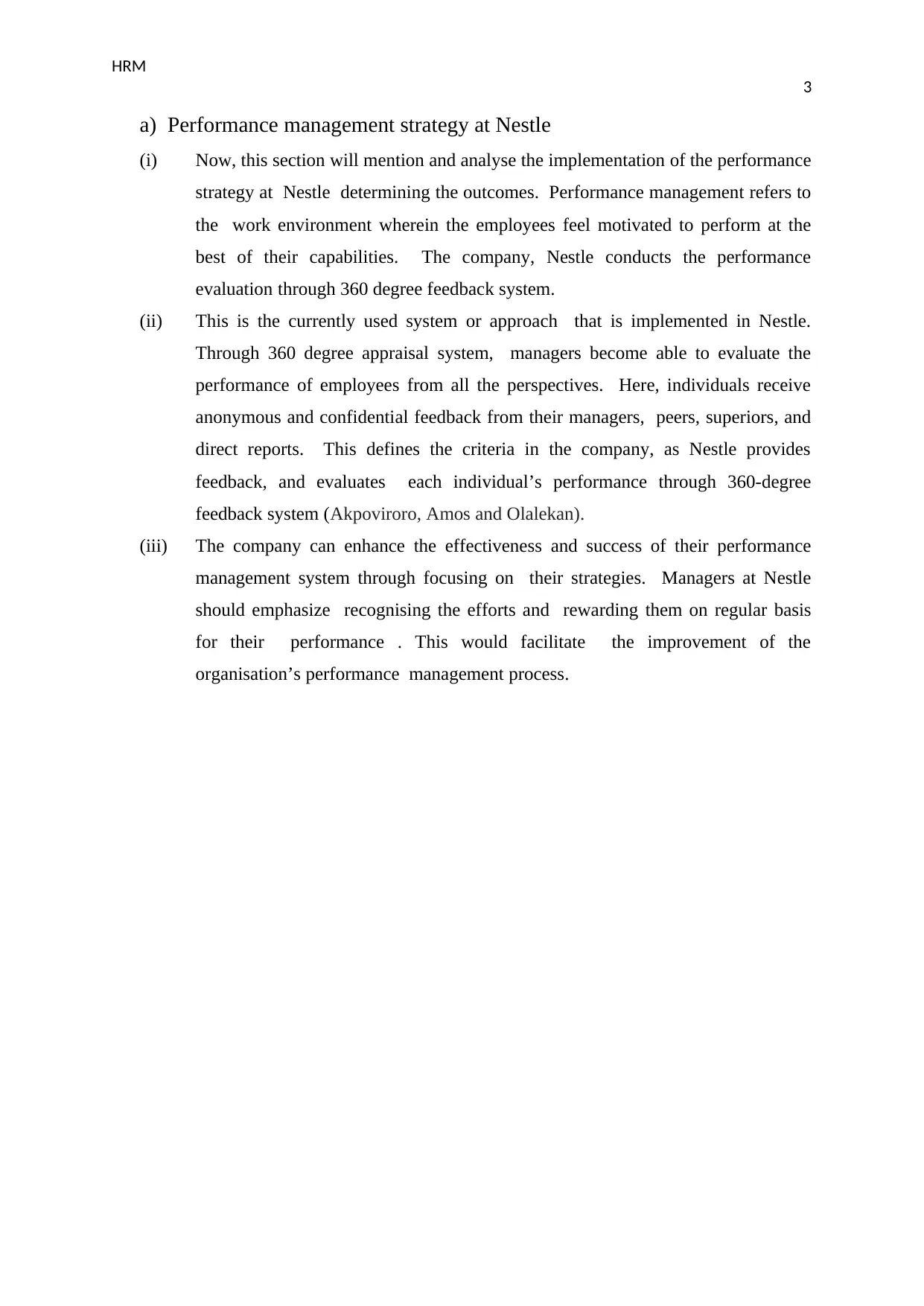
HRM
3
a) Performance management strategy at Nestle
(i) Now, this section will mention and analyse the implementation of the performance
strategy at Nestle determining the outcomes. Performance management refers to
the work environment wherein the employees feel motivated to perform at the
best of their capabilities. The company, Nestle conducts the performance
evaluation through 360 degree feedback system.
(ii) This is the currently used system or approach that is implemented in Nestle.
Through 360 degree appraisal system, managers become able to evaluate the
performance of employees from all the perspectives. Here, individuals receive
anonymous and confidential feedback from their managers, peers, superiors, and
direct reports. This defines the criteria in the company, as Nestle provides
feedback, and evaluates each individual’s performance through 360-degree
feedback system (Akpoviroro, Amos and Olalekan).
(iii) The company can enhance the effectiveness and success of their performance
management system through focusing on their strategies. Managers at Nestle
should emphasize recognising the efforts and rewarding them on regular basis
for their performance . This would facilitate the improvement of the
organisation’s performance management process.
3
a) Performance management strategy at Nestle
(i) Now, this section will mention and analyse the implementation of the performance
strategy at Nestle determining the outcomes. Performance management refers to
the work environment wherein the employees feel motivated to perform at the
best of their capabilities. The company, Nestle conducts the performance
evaluation through 360 degree feedback system.
(ii) This is the currently used system or approach that is implemented in Nestle.
Through 360 degree appraisal system, managers become able to evaluate the
performance of employees from all the perspectives. Here, individuals receive
anonymous and confidential feedback from their managers, peers, superiors, and
direct reports. This defines the criteria in the company, as Nestle provides
feedback, and evaluates each individual’s performance through 360-degree
feedback system (Akpoviroro, Amos and Olalekan).
(iii) The company can enhance the effectiveness and success of their performance
management system through focusing on their strategies. Managers at Nestle
should emphasize recognising the efforts and rewarding them on regular basis
for their performance . This would facilitate the improvement of the
organisation’s performance management process.
Paraphrase This Document
Need a fresh take? Get an instant paraphrase of this document with our AI Paraphraser
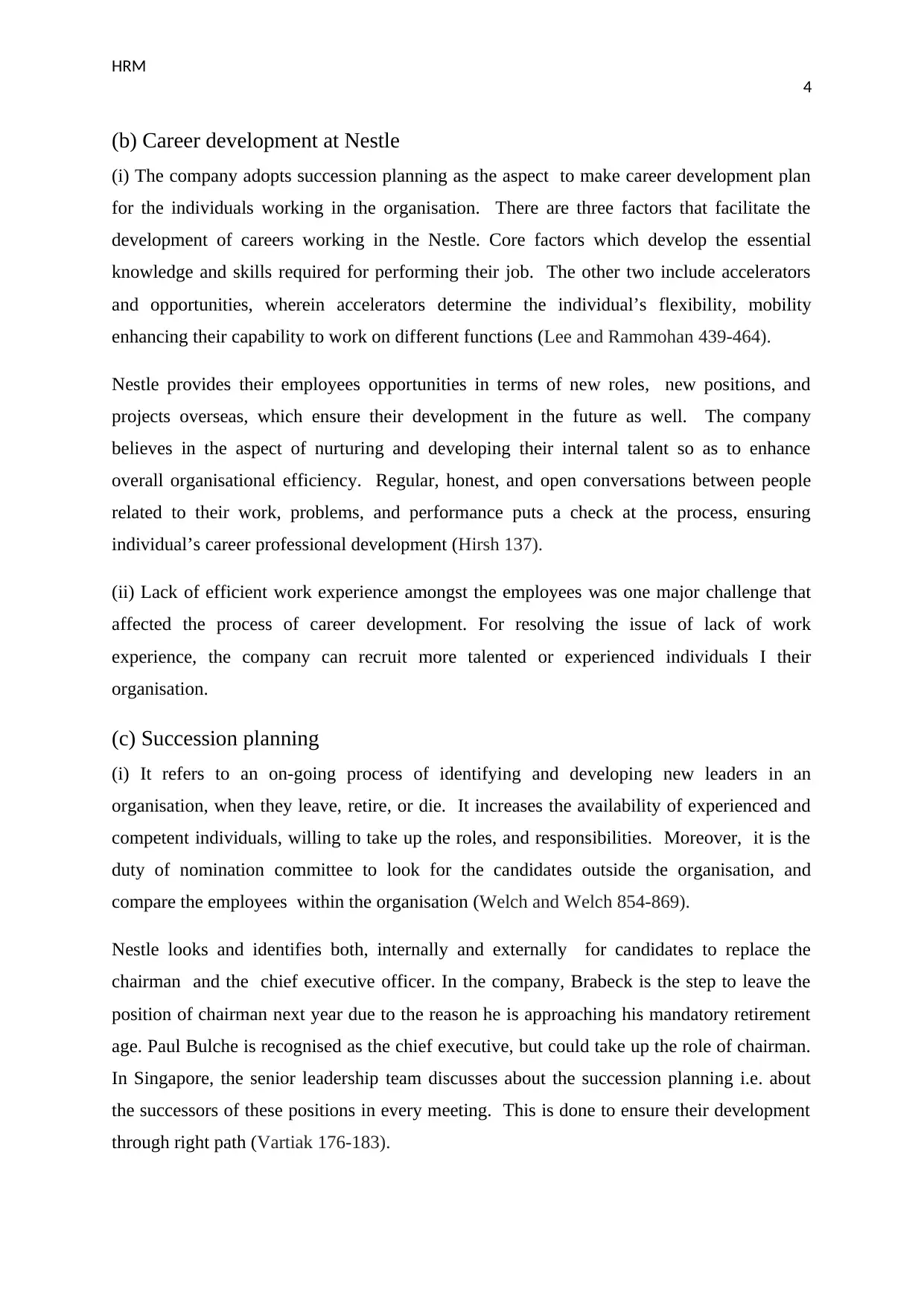
HRM
4
(b) Career development at Nestle
(i) The company adopts succession planning as the aspect to make career development plan
for the individuals working in the organisation. There are three factors that facilitate the
development of careers working in the Nestle. Core factors which develop the essential
knowledge and skills required for performing their job. The other two include accelerators
and opportunities, wherein accelerators determine the individual’s flexibility, mobility
enhancing their capability to work on different functions (Lee and Rammohan 439-464).
Nestle provides their employees opportunities in terms of new roles, new positions, and
projects overseas, which ensure their development in the future as well. The company
believes in the aspect of nurturing and developing their internal talent so as to enhance
overall organisational efficiency. Regular, honest, and open conversations between people
related to their work, problems, and performance puts a check at the process, ensuring
individual’s career professional development (Hirsh 137).
(ii) Lack of efficient work experience amongst the employees was one major challenge that
affected the process of career development. For resolving the issue of lack of work
experience, the company can recruit more talented or experienced individuals I their
organisation.
(c) Succession planning
(i) It refers to an on-going process of identifying and developing new leaders in an
organisation, when they leave, retire, or die. It increases the availability of experienced and
competent individuals, willing to take up the roles, and responsibilities. Moreover, it is the
duty of nomination committee to look for the candidates outside the organisation, and
compare the employees within the organisation (Welch and Welch 854-869).
Nestle looks and identifies both, internally and externally for candidates to replace the
chairman and the chief executive officer. In the company, Brabeck is the step to leave the
position of chairman next year due to the reason he is approaching his mandatory retirement
age. Paul Bulche is recognised as the chief executive, but could take up the role of chairman.
In Singapore, the senior leadership team discusses about the succession planning i.e. about
the successors of these positions in every meeting. This is done to ensure their development
through right path (Vartiak 176-183).
4
(b) Career development at Nestle
(i) The company adopts succession planning as the aspect to make career development plan
for the individuals working in the organisation. There are three factors that facilitate the
development of careers working in the Nestle. Core factors which develop the essential
knowledge and skills required for performing their job. The other two include accelerators
and opportunities, wherein accelerators determine the individual’s flexibility, mobility
enhancing their capability to work on different functions (Lee and Rammohan 439-464).
Nestle provides their employees opportunities in terms of new roles, new positions, and
projects overseas, which ensure their development in the future as well. The company
believes in the aspect of nurturing and developing their internal talent so as to enhance
overall organisational efficiency. Regular, honest, and open conversations between people
related to their work, problems, and performance puts a check at the process, ensuring
individual’s career professional development (Hirsh 137).
(ii) Lack of efficient work experience amongst the employees was one major challenge that
affected the process of career development. For resolving the issue of lack of work
experience, the company can recruit more talented or experienced individuals I their
organisation.
(c) Succession planning
(i) It refers to an on-going process of identifying and developing new leaders in an
organisation, when they leave, retire, or die. It increases the availability of experienced and
competent individuals, willing to take up the roles, and responsibilities. Moreover, it is the
duty of nomination committee to look for the candidates outside the organisation, and
compare the employees within the organisation (Welch and Welch 854-869).
Nestle looks and identifies both, internally and externally for candidates to replace the
chairman and the chief executive officer. In the company, Brabeck is the step to leave the
position of chairman next year due to the reason he is approaching his mandatory retirement
age. Paul Bulche is recognised as the chief executive, but could take up the role of chairman.
In Singapore, the senior leadership team discusses about the succession planning i.e. about
the successors of these positions in every meeting. This is done to ensure their development
through right path (Vartiak 176-183).
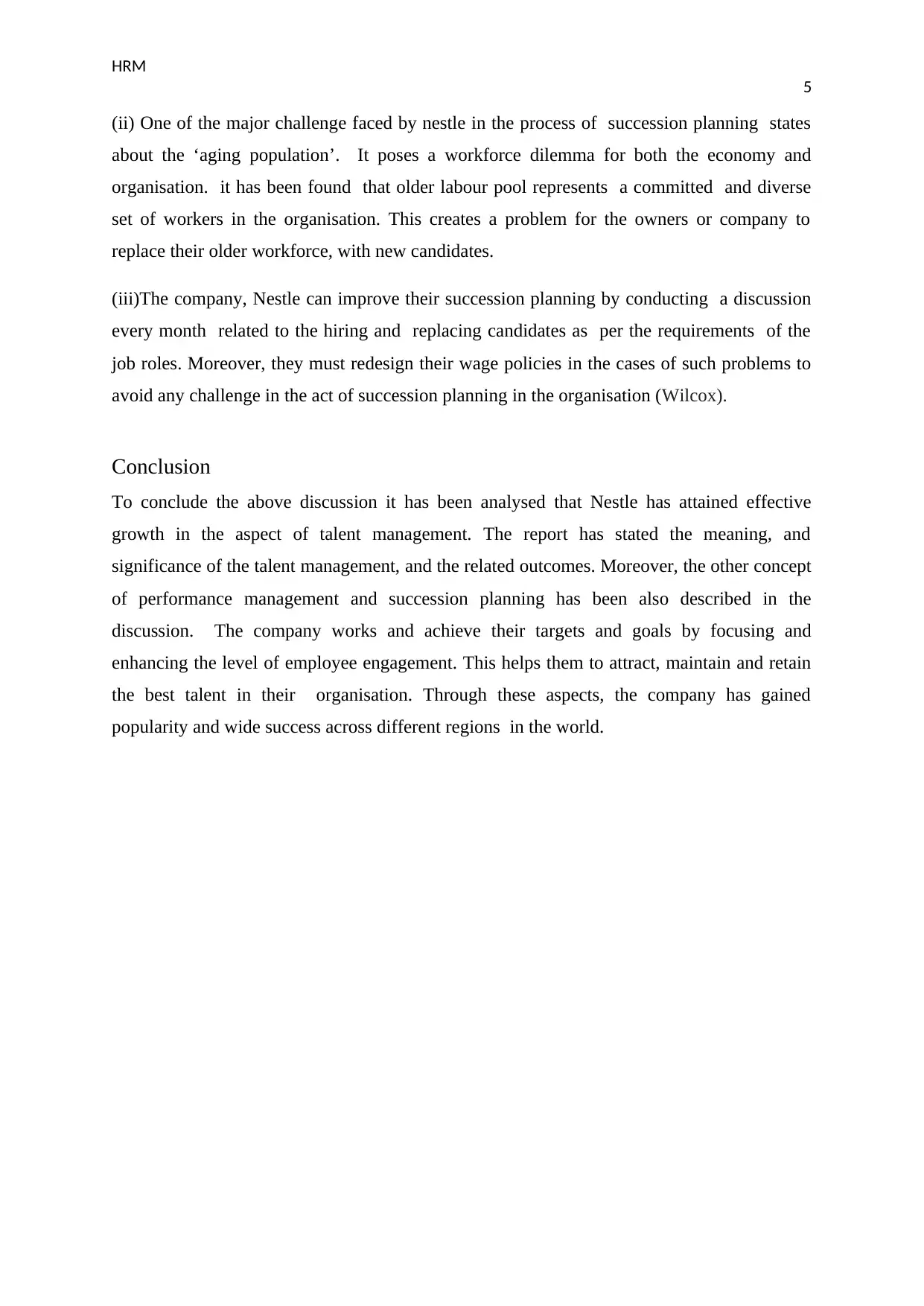
HRM
5
(ii) One of the major challenge faced by nestle in the process of succession planning states
about the ‘aging population’. It poses a workforce dilemma for both the economy and
organisation. it has been found that older labour pool represents a committed and diverse
set of workers in the organisation. This creates a problem for the owners or company to
replace their older workforce, with new candidates.
(iii)The company, Nestle can improve their succession planning by conducting a discussion
every month related to the hiring and replacing candidates as per the requirements of the
job roles. Moreover, they must redesign their wage policies in the cases of such problems to
avoid any challenge in the act of succession planning in the organisation (Wilcox).
Conclusion
To conclude the above discussion it has been analysed that Nestle has attained effective
growth in the aspect of talent management. The report has stated the meaning, and
significance of the talent management, and the related outcomes. Moreover, the other concept
of performance management and succession planning has been also described in the
discussion. The company works and achieve their targets and goals by focusing and
enhancing the level of employee engagement. This helps them to attract, maintain and retain
the best talent in their organisation. Through these aspects, the company has gained
popularity and wide success across different regions in the world.
5
(ii) One of the major challenge faced by nestle in the process of succession planning states
about the ‘aging population’. It poses a workforce dilemma for both the economy and
organisation. it has been found that older labour pool represents a committed and diverse
set of workers in the organisation. This creates a problem for the owners or company to
replace their older workforce, with new candidates.
(iii)The company, Nestle can improve their succession planning by conducting a discussion
every month related to the hiring and replacing candidates as per the requirements of the
job roles. Moreover, they must redesign their wage policies in the cases of such problems to
avoid any challenge in the act of succession planning in the organisation (Wilcox).
Conclusion
To conclude the above discussion it has been analysed that Nestle has attained effective
growth in the aspect of talent management. The report has stated the meaning, and
significance of the talent management, and the related outcomes. Moreover, the other concept
of performance management and succession planning has been also described in the
discussion. The company works and achieve their targets and goals by focusing and
enhancing the level of employee engagement. This helps them to attract, maintain and retain
the best talent in their organisation. Through these aspects, the company has gained
popularity and wide success across different regions in the world.
⊘ This is a preview!⊘
Do you want full access?
Subscribe today to unlock all pages.

Trusted by 1+ million students worldwide
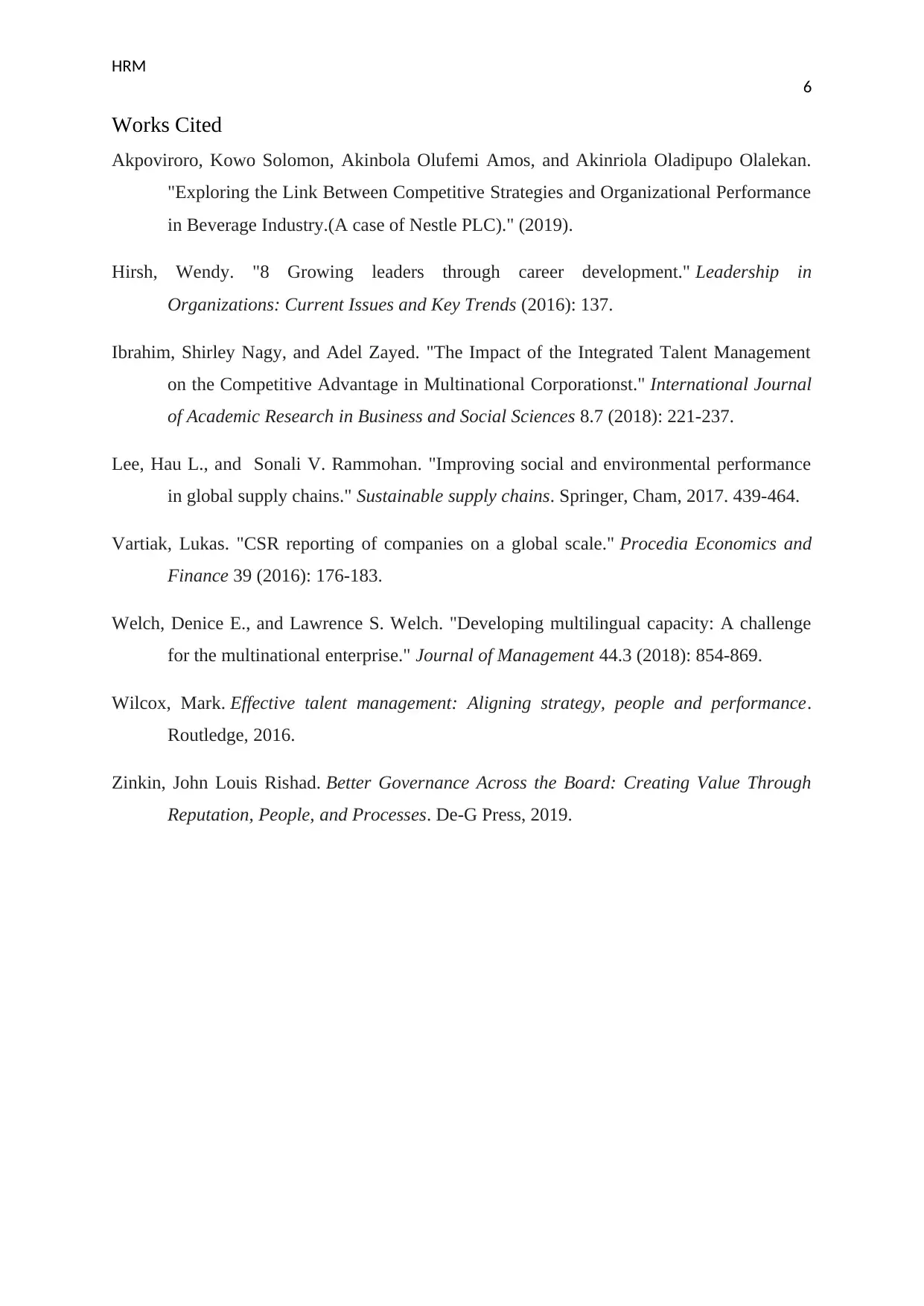
HRM
6
Works Cited
Akpoviroro, Kowo Solomon, Akinbola Olufemi Amos, and Akinriola Oladipupo Olalekan.
"Exploring the Link Between Competitive Strategies and Organizational Performance
in Beverage Industry.(A case of Nestle PLC)." (2019).
Hirsh, Wendy. "8 Growing leaders through career development." Leadership in
Organizations: Current Issues and Key Trends (2016): 137.
Ibrahim, Shirley Nagy, and Adel Zayed. "The Impact of the Integrated Talent Management
on the Competitive Advantage in Multinational Corporationst." International Journal
of Academic Research in Business and Social Sciences 8.7 (2018): 221-237.
Lee, Hau L., and Sonali V. Rammohan. "Improving social and environmental performance
in global supply chains." Sustainable supply chains. Springer, Cham, 2017. 439-464.
Vartiak, Lukas. "CSR reporting of companies on a global scale." Procedia Economics and
Finance 39 (2016): 176-183.
Welch, Denice E., and Lawrence S. Welch. "Developing multilingual capacity: A challenge
for the multinational enterprise." Journal of Management 44.3 (2018): 854-869.
Wilcox, Mark. Effective talent management: Aligning strategy, people and performance.
Routledge, 2016.
Zinkin, John Louis Rishad. Better Governance Across the Board: Creating Value Through
Reputation, People, and Processes. De-G Press, 2019.
6
Works Cited
Akpoviroro, Kowo Solomon, Akinbola Olufemi Amos, and Akinriola Oladipupo Olalekan.
"Exploring the Link Between Competitive Strategies and Organizational Performance
in Beverage Industry.(A case of Nestle PLC)." (2019).
Hirsh, Wendy. "8 Growing leaders through career development." Leadership in
Organizations: Current Issues and Key Trends (2016): 137.
Ibrahim, Shirley Nagy, and Adel Zayed. "The Impact of the Integrated Talent Management
on the Competitive Advantage in Multinational Corporationst." International Journal
of Academic Research in Business and Social Sciences 8.7 (2018): 221-237.
Lee, Hau L., and Sonali V. Rammohan. "Improving social and environmental performance
in global supply chains." Sustainable supply chains. Springer, Cham, 2017. 439-464.
Vartiak, Lukas. "CSR reporting of companies on a global scale." Procedia Economics and
Finance 39 (2016): 176-183.
Welch, Denice E., and Lawrence S. Welch. "Developing multilingual capacity: A challenge
for the multinational enterprise." Journal of Management 44.3 (2018): 854-869.
Wilcox, Mark. Effective talent management: Aligning strategy, people and performance.
Routledge, 2016.
Zinkin, John Louis Rishad. Better Governance Across the Board: Creating Value Through
Reputation, People, and Processes. De-G Press, 2019.
1 out of 7
Related Documents
Your All-in-One AI-Powered Toolkit for Academic Success.
+13062052269
info@desklib.com
Available 24*7 on WhatsApp / Email
![[object Object]](/_next/static/media/star-bottom.7253800d.svg)
Unlock your academic potential
Copyright © 2020–2025 A2Z Services. All Rights Reserved. Developed and managed by ZUCOL.





